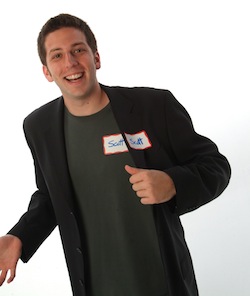Artists must nurture excellent communication skills, be approachable, and learn how to handle the opportunities that arise for obtaining gallery representation and selling to buyers.
I called on Scott Ginsberg of “HELLO, my name is Scott” fame to talk with me about how we can do a better job of this. The interview was recorded last fall for the Silver members of my Art Biz Incubator. Highlights of our conversation include:
- Some specific ways artists can increase approachability.
- Why approachability is important in communication.
- How you can bring more life to your conversations.
- How to start, maintain and close conversations with people.
I keep most of the library archives under lock and key for members only, but every now and then I will give you a sneak peek behind the scenes. That’s what I’m doing with this post, an audio interview originally for what was then called The Artist Conspiracy.
Listen
Listen here:
[powerpress url=”http://www.artbizcoach.com/audio/conspiracy-nametagscott.mp3″]
 Conspiracy members receive transcripts of all interviews.
Conspiracy members receive transcripts of all interviews.
About
Scott Ginsberg has been internationally recognized as “The World’s Expert On Nametags” and “The Authority on Approachability.” He’s frequently interviewed by various online, print, radio and TV media for his unique expertise, which is a result of wearing a nametag all day, every day.
Scott travels around the world speaking to companies, associations and universities.
To see how Scott practices what he preaches, just check out his Contact page. Talk about approachable! And you should follow Scott’s musings on Twitter: @Nametagscott



6 thoughts on “Secrets for Becoming More Approachable: Audio Interview”
Great ideas.
But on his contact page Scott decides to use a comma after the “Hello,” where it should be. Even when you’re quoting a nametag, where the comma is implied by the change in line and type size, No word yet on how the man feels about consistency with capitalization in titles (” . . . On Nametags . . . “on Approachability” . . . ).
Some of us feel that it’s attention to details like this in the language you’re using (English, in this case) that betrays a professionalism that colors your whole approach. We know all the excuses: “I was busy, it was late, it looked good at the time, I don’t need an editor.” Funny how none of the great writers would agree with that last one, isn’t it?
Maybe that’s an idea for a Twitter Tweekly: “When’s it OK to forget the details and just get something out there?”
Arthur: Point taken. I’ve been called unprofessional for forgetting a comma. I have no excuses.
I have fixed it – and made the capitalization to reflect the meta title on Scott’s site – since that’s the only place it really appears.
I always admit when I’m wrong and am happy to fix. And I will be wrong. I will make errors.
Alyson, I had no idea I was criticizing YOU. I think it’s a bigger deal somehow when the mistakes are in a professional presentation that is (more or less) set in stone. All the more reason to be cautious when quoting someone else’s titles, I guess. But I think we’re safe on the all-caps stuff. When quoting someone, it’s not necessary to mimic every cockamamie typographical trick the person might have used. Getting your point made without leaving stuff around for people to trip over is where it’s at with writing.
About that Tweekly: I still catch myself regularly (especially this season, when new shows are being planned all over the place) telling myself that some small detail in one of my pieces is “good enough” — thinking more about how the piece will be seen rather than whether it really satisfies me. With assemblage, like I do, it’s easy to argue that some small messy detail that most people won’t notice anyway could actually add to the work’s charm. But I think it’s worth remembering that it’s ourselves we’re ultimately trying to please — not the marketplace.
Arthur: It’s easy to be misunderstood online. I do hope you listened and got Scott’s message, which I believe is a valuable one.
I loved some of the things that were said in this recording….”give people a front row seat to their own brilliance” I put this up on the wall, it is beautiful. ” Leaving people better,” these are wonderful ways to interact with people. Thank you so much Scott and Alyson.
Pingback: Do You Need a Marketing Foundation or a Focus on Implementation — Art Biz Blog